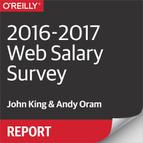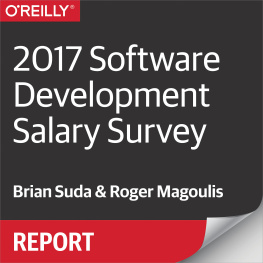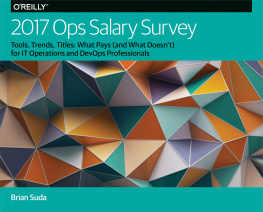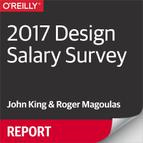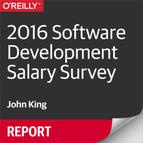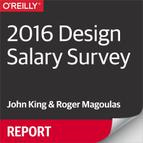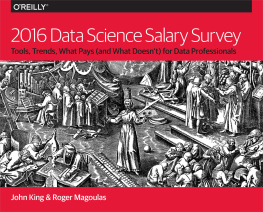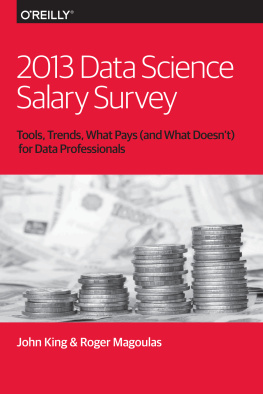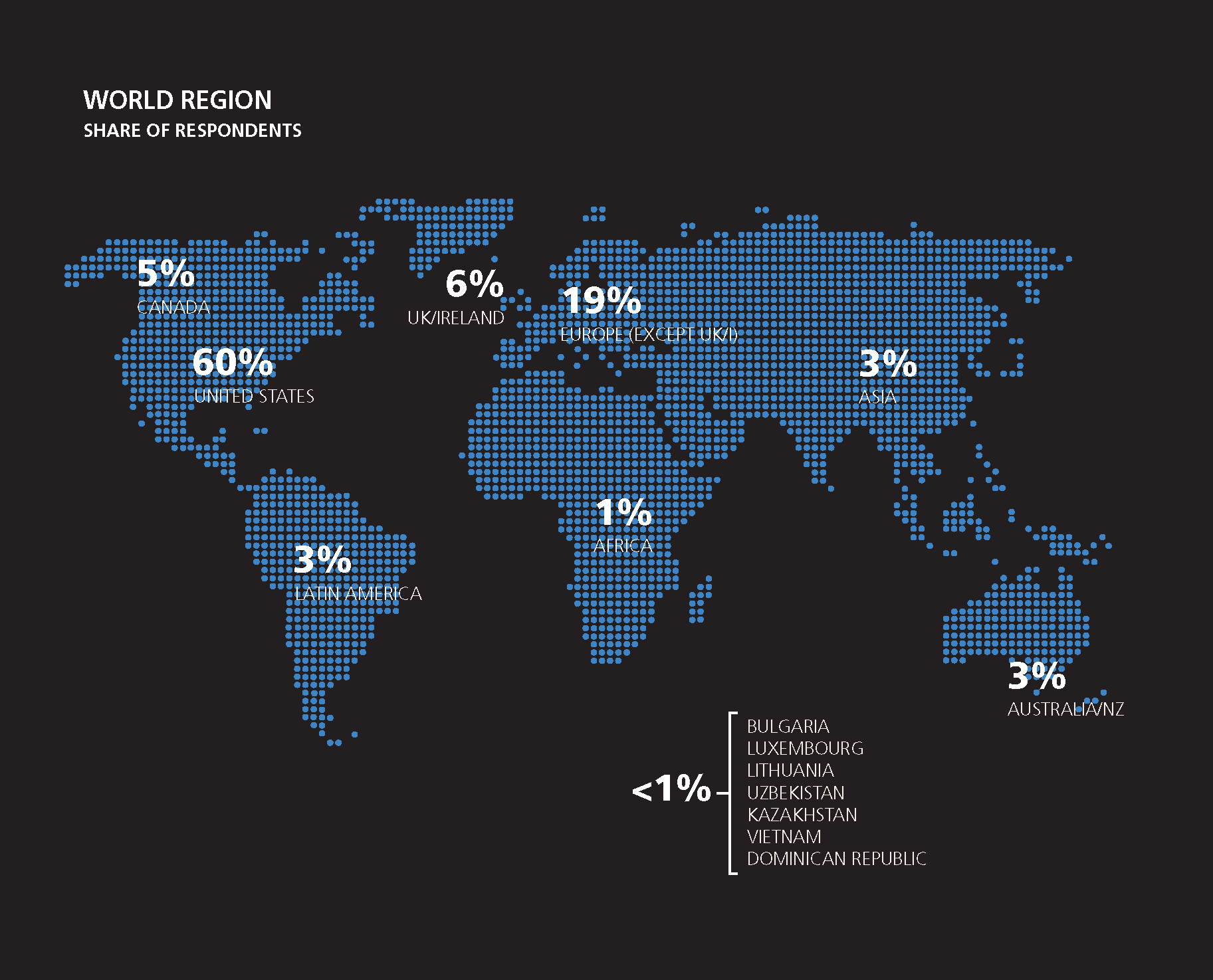20162017 Web Salary Survey
by John King and Andy Oram
Copyright 2017 OReilly Media. All rights reserved.
Printed in Canada.
Published by OReilly Media, Inc. , 1005 Gravenstein Highway North, Sebastopol, CA 95472.
OReilly books may be purchased for educational, business, or sales promotional use. Online editions are also available for most titles (http://oreilly.com/safari). For more information, contact our corporate/institutional sales department: 800-998-9938 or corporate@oreilly.com .
- Editor: Allyson MacDonald
- Production Manager: Colleen Cole
- Designer: Ron Bilodeau and Ellie Volckhausen
- Cover Designer: Karen Montgomery
- April 2017: First Edition
Revision History for the First Edition
- 2017-04-05: First Release
The OReilly logo is a registered trademark of OReilly Media, Inc. 20162017 Web Salary Survey, the cover image, and related trade dress are trademarks of OReilly Media, Inc.
While the publisher and the authors have used good faith efforts to ensure that the information and instructions contained in this work are accurate, the publisher and the authors disclaim all responsibility for errors or omissions, including without limitation responsibility for damages resulting from the use of or reliance on this work. Use of the information and instructions contained in this work is at your own risk. If any code samples or other technology this work contains or describes is subject to open source licenses or the intellectual property rights of others, it is your responsibility to ensure that your use thereof complies with such licenses and/or rights.
978-1-491-96901-4
[TI]
Intro
THE WEB IS A MAJOR EMPLOYER for computer programmersand designers. Many people see the web as their bigchance at a career that is both lucrative and fulfillingwitnessthe enormous number of companies that offer courses invarious types of web development, and the large numbers ofapplicants from whom they can choose their student bodies.
The World Wide Web began as an interlinked system forsharing hypertext documents amongst a small communityof scientists. Three decades later, the web is everywhere. Itsyour desktop browser, your phone, an app on your tablet, aticketing kiosk at the airport, your television, and even in yourcar. The web has grown up and it moves incredibly fast.
In its early days, JavaScript was mostly used to glue thingstogether in the browser. Fifteen years later, things are muchdifferent. JavaScript is one of the most popular and in-demandprogramming languages, and HTML5, CSS, andother core technologies making up the modern web havematured with it.
The web also occupies an interesting space in the field ofsoftware development as it proves a welcoming entry pointfor beginning programmers and subsequently a space foradvancement and specialization. The speed of change in webdevelopment, in terms of favored tooling, techniques, andstandards, allows for much innovation in a vibrant ecosystemof developers. It also presents some challenges for those tryingto keep up, or those trying to survey the field, for instance.
So what can you earn as a web developer? How does thetype of job, the language you use, or your geographic locationaffect your salary? Thats what this report, based on asurvey of more than 2,000 developers, tries to establish.
For the past few years, OReilly Media has conducted worldwidesalary surveys of people working in the computer field.Following a general survey of all computing positions, wereached out to those doing web work in order to producethis report.
In the survey, respondents shared details about themselves,the companies they work for, and their roles. We asked forspecifics regarding age, number of years in the field, jobdescription, number of work hours, etc. One of the mostinteresting parts of the report, we think, concerns tools,programming languages, and platforms. These have a majorimpact on salary.
Limitations
OF COURSE, OUR METHODS ARE INEXACT, and youshould be aware of several ways in which this report may failto reflect reality:
The sample size may sometimes be inadequate. Although2,000 is a large number of people and worth drawingconclusions from, the conclusions become less reliable aswe break down the respondents into groups that use aparticular tool.
We had to group people who differ in known ways.For instance, we sometimes lumped together peoplein different countries to get a sample large enoughto be meaningful, and obviously, salaries will vary indifferent places.
The respondents are self-chosen, not a random sample.They are likely to be people who use OReilly Mediaproducts and resources, and might not reflect the field asa whole.
Because we depend on what respondents say aboutthemselves, we have to trust them to be accurate andobjective. Some questions are deliberately subjectiveforinstance, we ask respondents to rate their own ability tonegotiate for a higher salary.
The data behind this report was collected in March andApril of 2016. Technical fields change quickly, and it hasbeen more than six months since the respondents filledout their surveys.
Respondents in the web area vary a great deal in bothresponsibilities and skills. There is also a great deal ofchurn in the field, and part-timers.
With these caveats in mind, lets see what our data tells us.
Large-Scale Findings
THE MEDIAN SALARY IS $78,000 (we use US dollars for allmoney in this report). Naturally, there is a lot of variation, but75% of respondents had a salary of at least $50,000, and 25%had a salary of at least $109,000. Things are changing fast,though: salaries rise quickly. 17% of respondents reported asalary raise of 20% to 30% over the past three years. The salaryraises also form a bell curve around this 17%. For instance,although 5% reported a decrease in salary, 16% reported thattheir salaries had doubled, or even done better, over three years.
The United States paid the highest salaries, with the averagebeing $98,000. Canada was also pretty high, with a medianof $79,000 (in US dollars), and Australia/New Zealand at$74,000. Compensation drops off rapidly after that:
UK and Ireland: average of $62,000
Rest of Europe: average of $43,000
Africa: average of $23,000 (but there was a rather hightop quartile of $41,000)
Asia: average of $21,000 (with a high top quartile of$47,000)
Latin America: average of $21,000 (with a high topquartile of $44,000)
The top quartile means that 25% of respondents earned morethan the amount listed. Of course, countries differ in taxationand the benefits they offer, so salaries have somewhat differentmeanings in different countries.
Because we got a lot of respondents from the US, we couldbreak them down by region. High salaries in California are nosurprise (particularly given the cost of living there), but thehigh average in Southwest/Mountain states is rather unexpected.(This category does not include California, which hasits own category.) Utah, with a large web developer community,as well as Colorado and Arizona all saw high salaries.
California: average of $120,000
Northeast: average of $105,000
Southwest/Mountain: average of $102,000
Pacific Northwest: average of $98,000
Mid-Atlantic: average of $96,000
South: average of $83,000
Midwest: average of $80,000
Next lets drill down into the differences between respondents.The data might affect your career choices.

